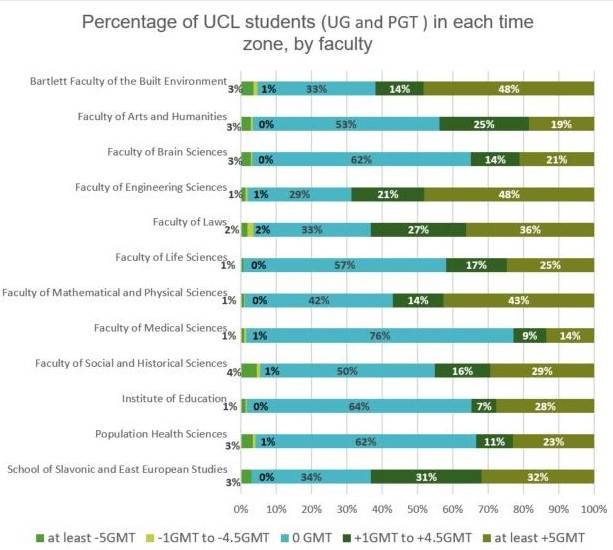London's global university: UCL students log on around the world
9 April 2020
UCL buildings may be closed, but learning hasn’t stopped. Data shows our students are logging on across the world to continue their studies, whatever their time zone.

As the coronavirus (Covid-19) outbreak escalated, UCL closed most buildings on Friday 20 March and students were strongly advised to return home wherever possible. Face-to-face teaching was suspended for the remainder of the academic year and any assessments must be completed remotely.
Our buildings may be closed – the University is not. The UCL community sprang into action; staff are meeting the challenge of moving teaching online and preparing alternative assessments with a huge amount of flexibility, patience and support for each other and our students.
Teaching, supervision and pastoral support continues as academic teams turn to Blackboard Collaborate sessions, Lecturecast recordings, Teams chats and more, to stay connected with their students and minimise disruption to learning and progression.
But where in the world are our students tuning in from? And what implications does this have for staff revising their sessions for remote delivery?
Student time zones
The Office for the Vice-Provost (Education & Student Affairs) has released data on the home time zones of our student population. Departmental, programme and module leaders can now see what number and proportion of their students are based within Greenwich Mean Time (GMT) locations. More importantly, the data shows the remainder of their students’ time zones in relation to GMT.
The chart below shows the percentage of students in each time zone, by Faculty. The full data set can be filtered by level of study (UG, PGT), department or programme.

Understanding how many of our students are more than one, two or five hours ahead of, or behind UK time may help staff with planning their approaches to teaching and student support.
As of 7 April 2020, the percentage of traffic to Moodle originating in the UK had dropped to 68% of total visits, with approximately seven thousand users connecting from outside the UK. After the UK, the most frequent origins of Moodle visits are China, Hong Kong, France and USA.
The full data is hosted on UCL’s Tableau site. To access, click on the link below and log in with your usual UCL credentials (username and password). Tableau is best accessed on a larger screen but can be viewed across a range of devices. The key questions answered by this dashboard are listed on the third tab.
If you are not yet registered to access Tableau or are unable to log in, please contact the Data and Insight team.
Managing a remote, not distant class
As we move to remote teaching for Term Three, it’s important that no one is disadvantaged as a result of their location or time zone. Relying solely on live – or synchronous – teaching events is not an option with such dispersed cohorts. Providing 'asynchronous' activities – where staff and students participate when and from where they can – reduces the impact of time zone differences.
Recorded lectures and seminars
Lectures can be pre-recorded using Lecturecast Universal Capture Personal. The tool can be used with a PC or Mac, in combination with a Powerpoint presentation, and recordings are uploaded to Lecturecast before release via Moodle. Most components of a traditional lecture can be included as part of a video lecture using Lecturecast Universal Capture Personal.
Assuming no updates are required, you could also re-publish Lecturecast recordings made in the previous academic year (if available) to the new Moodle module.
Lectures and seminars, for example, can also continue as live, synchronous events but should also be repeated or recorded for review by any students who are unable to attend. However, such students should not be disadvantaged by more limited opportunity for live interaction so, where possible, consider varying the times (am/pm) of live seminars so students of differing time zones have the opportunity for synchronous sessions.
Don’t forget to press record before starting any live sessions!
Discussion forums
Asynchronous, text-based discussion activities can also provide rich learning opportunities and are often simpler to set up. Moodle Forums are for more than just announcements; discussion forums are great for icebreaker activities, Q&A conversations and group or individual active learning tasks.
Further information
See the Teaching Continuity webpages for more guidance on moving to online teaching and supervision.
The Arena Centre and Digital Education colleagues are providing remote support on moving to online delivery and alternative forms of assessment.
To book a virtual drop-in, email the Teaching Continuity mailbox with your preferred time-slot for a Teams call between 10am- 4pm, Monday-Friday.
Digital Education are also hosting staff development sessions specifically on Moodle, Lecturecast, and Blackboard Collaborate – no booking required.
For guidance on or issues with UCL's online platforms, use the Teaching and assessment continuity online form.
 Close
Close

